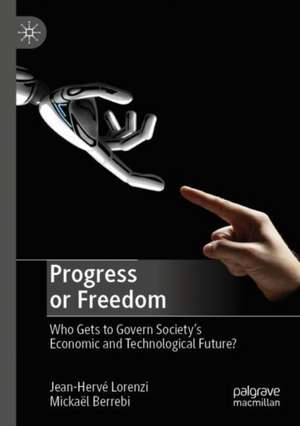Progress or Freedom: Who Gets to Govern Society’s Economic and Technological Future?
Autor Jean-Hervé Lorenzi, Mickaël Berrebi Traducere de Dina Leiferen Limba Engleză Paperback – 19 aug 2019
Preț: 198.95 lei
Nou
Puncte Express: 298
Preț estimativ în valută:
38.07€ • 41.48$ • 32.08£
38.07€ • 41.48$ • 32.08£
Carte tipărită la comandă
Livrare economică 23 aprilie-07 mai
Preluare comenzi: 021 569.72.76
Specificații
ISBN-13: 9783030195939
ISBN-10: 3030195937
Pagini: 215
Ilustrații: XV, 215 p. 35 illus., 34 illus. in color.
Dimensiuni: 148 x 210 x 16 mm
Greutate: 0.31 kg
Ediția:1st ed. 2019
Editura: Springer International Publishing
Colecția Palgrave Macmillan
Locul publicării:Cham, Switzerland
ISBN-10: 3030195937
Pagini: 215
Ilustrații: XV, 215 p. 35 illus., 34 illus. in color.
Dimensiuni: 148 x 210 x 16 mm
Greutate: 0.31 kg
Ediția:1st ed. 2019
Editura: Springer International Publishing
Colecția Palgrave Macmillan
Locul publicării:Cham, Switzerland
Cuprins
1. Introduction: The New Human Condition.- 2. A Major Stagnation, But Not a Secular One.- 3. The High Tech Eden.- 4. A Shattered Labour Market.- 5. Human Genius at the Controls.- 6. A Disengaged Society?.- 7. Who Governs: Politicians, or Technology Prophets?.- 8. Two Possible Paths: The Great Parting of Ways.- 9. Re-humanising the World.
Notă biografică
Jean-Hervé Lorenzi is Professor of Economics at Paris-Dauphine University, France and President of the Cercle des économistes.
Mickaël Berrebi graduated from the Ecole Supérieure des Sciences Economiques et Commerciales (ESSEC) in Paris and received his masters from Paris-Dauphine University, France. He is a fully qualified actuary and works as a financial advisor.
Textul de pe ultima copertă
Technological dominance is shifting the balance of global economic stability. This is the central premise behind the latest book from Lorenzi and Berrebi who view the rise of artificial intelligence, robotics, use of private data, and genetic transformation, among other developments, culminating in new economic conditions that require a fresh sense of governance in order for society to sustain order. Whilst progress in technology provides numerous opportunities and hope, is the desire to pursue these ambitions in innovation putting our society at risk of being undermined and, ultimately, governed by technology firms? How will these changes affect economic outlooks in an age of growing inequality and aging populations? What role do politicians serve in facilitating these changes? The decline of a labour force, the use of Big Data and increased speeds of communication are but three examples that the authors address in their quest to understand where the limits should lie between progressand disruption for the future of society.
Caracteristici
Challenges the dominance and power of technology companies and the vacuum left by economists and politicians Affirms the primacy of humans over machines and the consideration of rational arguments over prophecy Considers a future where scientific breakthroughs must be governed by rules agreed on a global scale
